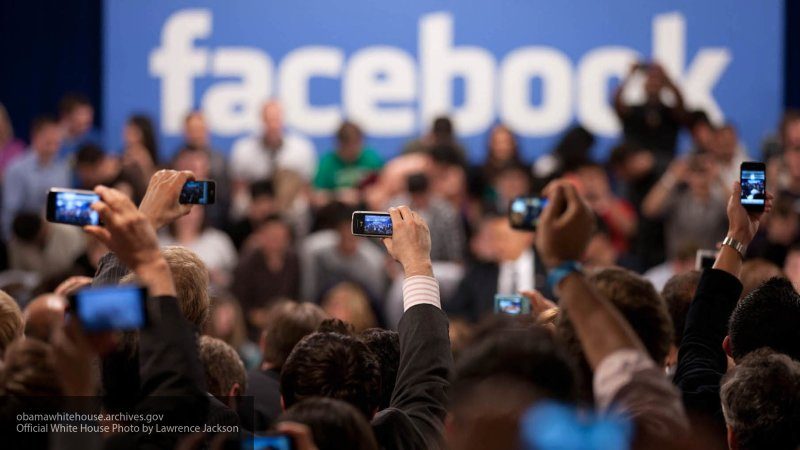Ime Archibong plays a unique role in Mark Zuckerberg’s orbit.
For nearly a decade, Zuckerberg has turned to Archibong any time he’s come up with ideas for special projects at Facebook. Archibong is also Zuckerberg’s point person in dealing with third-party developers. Outside of the office, the two executives are running buddies.
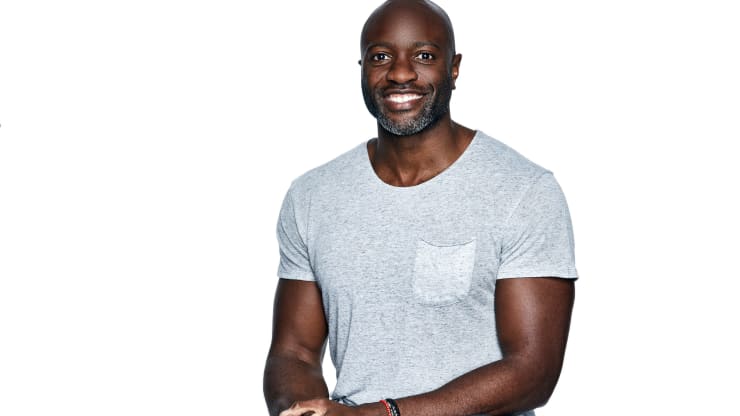
Courtesy of Facebook
While Archibong, 38, has been a critical player at Facebook since joining the company in 2010, his position today is more central than ever. He’s the company’s head of new product experimentation, responsible for helping Facebook find its next big hit. He’s also among the highest-ranking Black executives at the company, and the unofficial leader of the Black employee base at a time when racial tension internally and across the company’s advertiser universe has reached a boiling point.
After the killing of George Floyd in late May by a police officer in Minneapolis and the subsequent nationwide protests for racial justice, tech’s perpetual diversity problem resurfaced as a hot topic in Silicon Valley. Facebook, where Blacks make up only 3.1% of the staff, faces the added risk of losing big business after activist groups sparked a widespread advertising boycott, leading major brands to demand that the company crack down on hate speech across its platform.
Archibong, Facebook’s lone Black vice president in charge of a product division, spoke up in June as Black Lives Matter protests captured the nation’s attention. On Facebook’s internal social network, he wrote about his experience as a Black man in America, according to an employee, who asked not to be named because he wasn’t authorized to speak about it publicly. A month earlier, he addressed the killing in Georgia of Ahmaud Arbery, who was followed by a group of white men and gunned down while on a jog.
The graphic Arbery video went viral, while across the country the coronavirus pandemic was disproportionately affecting minorities. Archibong took to Facebook to express his feelings.
“A selfish silver lining of this pandemic has been the lack of anxiety I’ve felt running alone,” wrote Archibong. “In my head, now most people quickly shuffled to avoid me out of fear of a hidden virus, not my blackness. That was all snatched away this week as Ahmaud Arbery’s story and video surfaced. It hurts.”
CNBC spoke with more than a dozen current and former Facebook employees and business partners, who have worked with Archibong, about his dual roles at the company and his relationship with Zuckerberg. Most requested anonymity because of confidentiality agreements.
Archibong was named head of Facebook’s New Product Experimentation (NPE) division, when the unit was launched a year ago. The group’s task, according to NPE’s website, is to build “new apps focused on giving people entirely new experiences for building community.”
Facebook said it set up NPE as its own division because, “unlike Facebook’s family of apps, NPE Team apps will change very rapidly and will be shut down if we learn that they’re not useful to people.” The website also says, “We expect many failures.”
Facebook’s existing apps include its original “big blue app” as well as Messenger. It also wraps in Instagram, WhatsApp and Oculus, which were all acquired between 2012 and 2014. Despite Facebook’s many efforts to diversify, the company still counts on advertising for about 98% of its more than $70 billion in annual revenue, predominantly from its main app and Instagram.
Facebook’s previous efforts to create skunkworks groups have been unsuccessful. The company had a Creative Labs division, which was shut down in 2015. A lab for hardware products called Building 8 produced the Portal video-calling device, but it was then integrated into Facebook’s AR/VR division in 2018.

Archibong, like leaders of those efforts, has to contend with an inherent challenge familiar to large incumbent tech companies. In developing new apps, Facebook is competing with start-ups that are hungry and focused and have to win with a single product to stay in existence. If a team inside Facebook fails at a project, the members are simply reassigned within the company, a former employee said.
So far, NPE has yet to make a splash. The team has launched several products, including Tuned, an app for couples; Hobbi, which helps users track progress on personal projects; CatchUp, a voice-calling service; and Bump, an app for anonymous conversations with other users.
In total, NPE apps have been downloaded 37,250 times, according to Sensor Tower. Tune accounts for nearly half of those downloads.
Facebook declined to make Archibong available for an interview. A spokeswoman told CNBC that he “is heads down focused on NPE and building products with his team.”
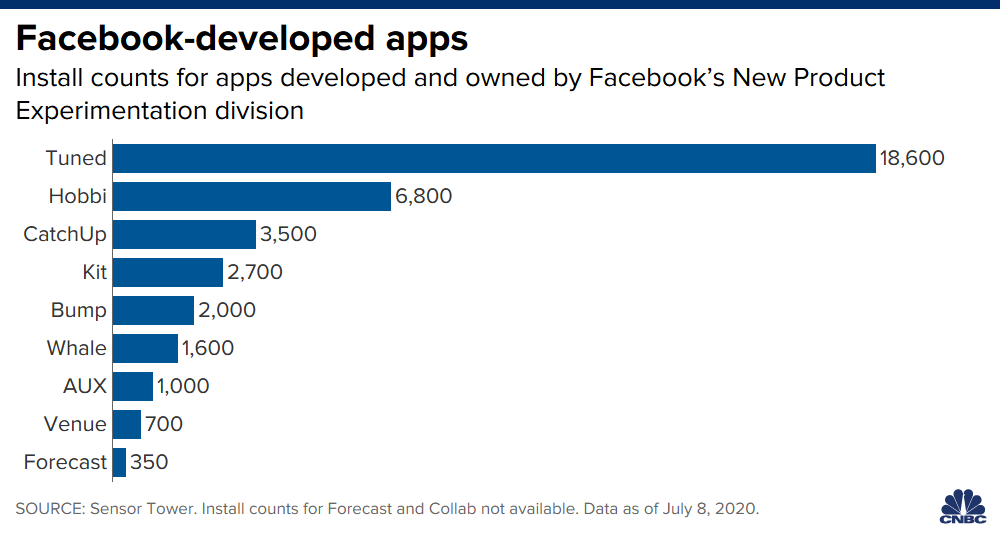
Running with Zuck
Archibong came to Facebook from IBM, where he worked in both technical and business roles. He studied computer science and electrical engineering at Yale, and later earned his master’s in business administration from Stanford.
His original focus at Facebook was on the business side, working on product partnerships under Chief Operating Officer Sheryl Sandberg and Dan Rose, who was vice president of partnerships before leaving in 2018.
Early in his tenure, Archibong gained a reputation for his work ethic. He’s typically the first person in the office, hammering away at his computer at 6 a.m., according to people who have worked with him. Bari Williams, Facebook’s lead senior counsel until 2016, said his early arrival allowed Archibong to double as morning DJ.
Williams said Archibong has the rare ability to both build technology and create things of value. He’s a listed inventor on more than a dozen patents.
“Ime can see how something can be successful technically but have business shortcomings, and he can see how something might be a business success but a technical failure,” Williams said. “He can spot both sides.”
Archibong, who’s 6 feet 3 inches tall, played guard on Yale’s basketball team from 1999 to 2003, and is known around the Facebook campus for his exercise regimen and athletic skills.
A few years ago, in a San Francisco recreational basketball league game, Archibong was guarded by Akintunde Ismail Maiyegun, a fellow tech executive. Maiyegun said he blocked one of Archibong’s shots, leading to some trash talk. Later in the game, Archibong got his revenge, sprinting down the court with the ball and dunking over Maiyegun’s outstretched arms.
“That was just a moment where I just appreciated how out of this world he was,” Maiyegun said.
Archibong has several running partners at Facebook. One of them is Zuckerberg, who made it one of his New Year’s resolutions in 2016 to run 365 miles that year. Running is a shared hobby that helped Archibong bond with his boss.
But getting into Zuckerberg’s inner circle at Facebook requires sharing his worldview, and Archibong is a big believer in the company’s ability to connect people. Archibong’s colleagues say he talks often of Facebook’s role in bringing people together.
“I have this notion that people create special things when they’re able to connect with each other and understand each other,” Archibong told CNBC in 2016.
Archibong, the son of Nigerian immigrants, was part of the team that set the foundation for Internet.org, a Facebook initiative to get people online in emerging markets like Africa. In 2016, he lobbied Zuckerberg to visit the continent to check out the tech landscape.
Jeremy Johnson, the CEO of Andela, a tech start-up that operates on the continent, helped plan the trip.
“There’s a baseline understanding that Ime is someone you can count on,” said Johnson, whose company is backed by Zuckerberg’s philanthropic Chan Zuckerberg Initiative. “Not just with Mark’s interactions, but it feels like more broadly across Facebook that’s the general feeling — Ime is someone who will get things done and you can and should trust.”
Archibong oversaw growth of Facebook’s community of developers, getting them to adopt key features like social plugins — the share and like buttons — and the Facebook Login. He became a staple at F8, Facebook’s annual developer conference.
Zuckerberg’s trust in Archibong was on clearest display during one of the company’s most tumultuous moments.
In March 2018, reports surfaced that political consulting firm Cambridge Analytica had improperly accessed the data of 87 million Facebook users, and used that information to target ads for Donald Trump during the 2016 U.S. presidential election. Facebook’s reputation was already tainted from mounds of evidence that Russians used the site to spread disinformation ahead of democratic elections in the U.S. and other countries.
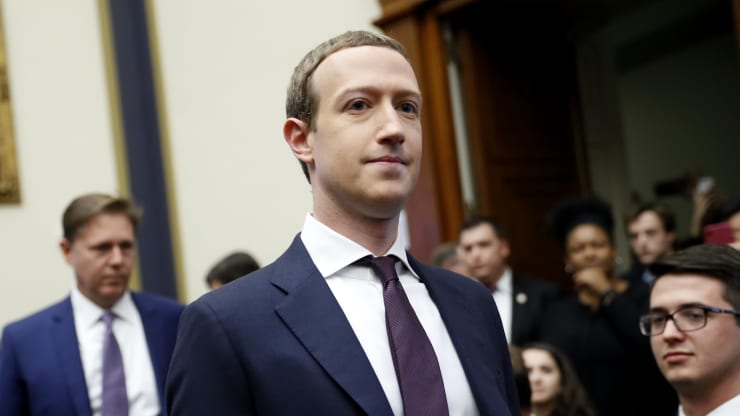
Andrew Harrer | Bloomberg | Getty Images
Following the Cambridge Analytica revelations, Zuckerberg vowed the company would investigate other apps that had access to similar information and audit any with suspicious activity. Archibong was charged with leading the audit to determine who had accessed problematic data and making sure developers couldn’t still exploit the platform, two former Facebook executives said.
Archibong’s clean-up job took over a year and ultimately resulted in the suspension of “tens of thousands of apps” associated with 400 software developers, according to a September 2019 blog post. Facebook also sued a number of developers.
“App developers remain a vital part of the Facebook ecosystem,” Archibong wrote. “They help to make our world more social and more engaging. But people need to know we’re protecting their privacy. And across the board, we’re making progress.”
Ime’s other job
Archibong is again positioned to emerge as a big voice at a time of crisis.
In May, as Black Lives Matter protests were picking up, President Trump posted on Facebook, “when the looting starts, the shooting starts.” Twitter flagged the post for potentially inciting violence, but Facebook did nothing even as some employees claimed it violated the company’s community standards.
Archibong hasn’t publicly weighed in on the matter, but he’s come to Facebook’s defense in the past.
In 2018, a former Black employee named Mark Luckie alleged in a lengthy post that the company had a “black people problem.” Archibong responded to Luckie in a message that was made public, expressing his disappointment at the post and adding that he didn’t think Luckie’s experience was representative of his Black colleagues.
“There’s always more work to be done — and all the folks who have been here for several years doing this work have never been shy about saying that,” Archibong wrote, after Luckie posted their conversation on Twitter.
The numbers are troubling for Facebook. According to the company’s own diversity report from 2019, only 1.5% of technical roles and 3.1% of senior leadership positions are held by Black employees. In June, amid the Black Lives Matter protests, Facebook promised to increase the representation of people of color in leadership positions by 30% over the next five years. Facebook also committed $200 million toward Black-owned businesses and organizations.
Former employees told CNBC that Black workers are frequently the most qualified people on their teams and have the most advanced degrees, but they still often don’t get the promotions they deserve. One former Black employee said he left after repeatedly getting passed over for advancement.
Archibong has spent years pushing for diversity and inclusion at the company. He helped create the Black@ employee resource group in 2012 and four years later the Black Community Summit, an annual event for Black employees that typically includes a talk from either Zuckerberg or Sandberg. The summit was originally held on a single day but now spans two days.
Off campus, Archibong is an alum of Management Leadership for Tomorrow, an organization that works with talented minorities to help advance their careers. Archibong landed his job at Facebook with help from MLT, and he continues to work with the group to create a pipeline for minorities to get hired, according to a person familiar with the matter.
“He uses his place in the world very effectively,” said Heather Starnes-Logwood, executive director at Live In Peace, a group that works with minorities in poor areas of Silicon Valley. Archibong is the organization’s chairman.
At Facebook, Archibong is exploring ways to bridge the gap between product development and activism. That involves developing new apps that resonate with consumers while simultaneously turning Facebook into a platform that uses its scale to help pursue equality and fight social injustice.
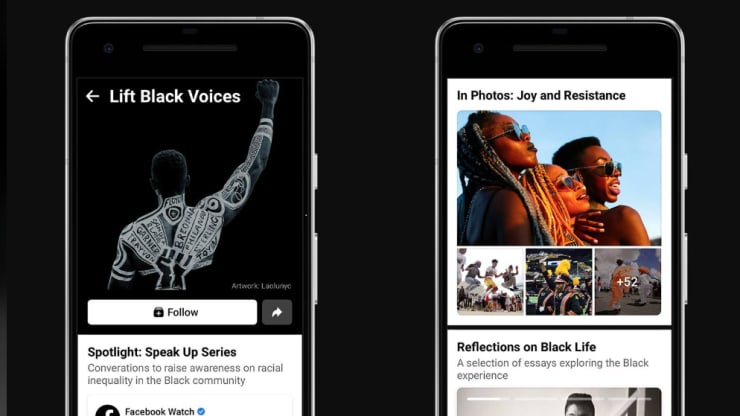
Ime Archibong, Facebook
Last month, Archibong shifted some of his NPE employees to work on products around racial justice as part of a broader initiative announced by Zuckerberg. Archibong posted screenshots on Facebook in mid-June of one of the submissions, which he described as a “new space we built to elevate Black Voices and Stories.”
It had only been two weeks, but Archibong had reason for enthusiasm.
“This was one of the more than 700 ideas submitted so far,” he wrote.
WATCH: Facebook will have to get their act together for the sake of larger advertisers
CNBC / Balkantimes.press
Napomena o autorskim pravima: Dozvoljeno preuzimanje sadržaja isključivo uz navođenje linka prema stranici našeg portala sa koje je sadržaj preuzet. Stavovi izraženi u ovom tekstu autorovi su i ne odražavaju nužno uredničku politiku The Balkantimes Press.
Copyright Notice: It is allowed to download the content only by providing a link to the page of our portal from which the content was downloaded. The views expressed in this text are those of the authors and do not necessarily reflect the editorial policies of The Balkantimes Press.

